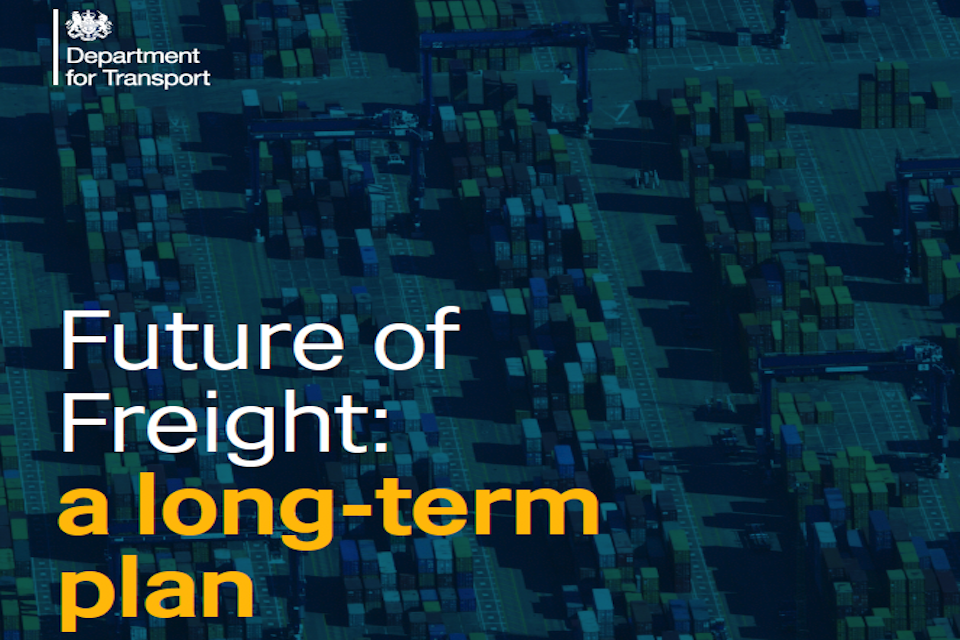UK government sets out a future of freight

An extensive report from the British government has set out its vision for the future of freight in the UK, covering all modes including rail. It says the entire sector must face up to future challenges to ensure it remains cost efficient, resilient and valued by society.
The document, “Future of Freight: a long-term plan”, outlines measures to establish a Strategic Freight Unit within Great British Railways, and to put a duty on that new infrastructure and management body to promote rail freight to help drive growth. It also says it wants to catch up with devolved governments in the UK by introducing a rail freight growth target. The government says it will soon launch a consultation on the latter proposal.
Invest to support rail freight growth
The report does appear to set out a coherent, multi-modal approach to freight management. That’s something that the industry and political commentators have frequently said is lacking in UK national strategic planning. In this report the government says it wants to support modal shift. It says government will work with industry to continue efforts to encourage a greater utilisation of freight across all modes, including modal shift to rail freight.

“Government remains fully committed to unlocking the economic and environmental benefits rail freight can deliver, including supporting decarbonisation and reducing congestion on Britain’s roads”, says the plan. “Government continues to invest to support rail freight growth, and will set out our priorities in the forthcoming publication of the Rail Network Enhancements Pipeline.”
Create new opportunities for growth
That commitment to the “forthcoming publication” of the RNEP may precipitate an intake of breath from the industry, which has been waiting for the “forthcoming” almost as long as the religious have been waiting for the “second coming”. However, the report says that as part of rail reform, the railway will have a long-term strategy which will set out, for the first time, key strategic priorities for the whole rail network for the next 30 years.
“The Williams-Shapps Plan for Rail, including commitments to a rail freight growth target, will further strengthen the place of rail freight on the national network, create new opportunities for growth and investment, and maximising its environmental benefits”, explains the report. “The government fully supports the continued growth and success of international rail freight services, where it has the potential to accommodate an even great shift of freight from road to rail and boost resilience. The government will continue to work closely with the sector to facilitate the launch of new routes, build on our close collaboration, including developing a bespoke inland customs clearance model for rail freight terminals.”
High priority to rail freight
This new plan, on the back of that Williams-Shapps Plan for Rail, says it enhances opportunities for rail Freight. “The government is committed to supporting rail freight to enable it to thrive and grow recognising the role the sector will play in achieving net zero targets and the government’s ambitious economic and Environmental agenda”, say its authors. “The WSPR rightly gave a high priority to the economic and environmental benefits of rail freight, putting rail freight at the centre of its reforms with ambitious plans to grow rail freight and ensure key protections for rail freight are prioritised.”

This new report backs up the recommendations of the WSPR in terms of what it calls “exciting opportunities for the rail freight sector”. They include a Strategic Freight Unit within Great British Railways dedicated to improving performance and efficiency across the network for rail freight customers.
Drive collaboration between government and freight
The report also places a duty on Great British Railways to promote rail freight to help drive rail freight growth, recognising the sector’s vast economic and environmental benefits. The Deportment for Transport also wants the introduction of a rail freight growth target, upon which the government say they will be consulting shortly.
The government also says it will use the Freight Council to review access to freight advisory services for users of freight, to promote and improve these services. The Freight Council is chaired by Trudy Harrison MP, a minister within the Department for Transport, and the designated author of this report.
The government says it wants to drive collaboration between Westminster and the freight sector. “Through the Freight Council we will improve understanding of cross-modal freight to explore opportunities for immediate capacity uplifts, create more capacity on network, such as new paths for rail freight [and] longer trains.” The Future of Freight plan is published now.
You just read one of our premium articles free of charge
Want full access? Take advantage of our exclusive offer






For proving resilent, for meeting with “future challenges”, now “height” has to be taken for added load, etc.
(Global devices, upgrade for higher load capacity, for lower costs. Now, so shall infrastructure of railways!
Railways shall not “remain”, but turn, “cost efficient, resilient and valued by society”!)
At reinvestments, etc., capacity and utilisation, of existing, decisively shall be added, by added load capacity.
(Advantage, nearness to ports, ocean, etc., shall be taken advantage of!)